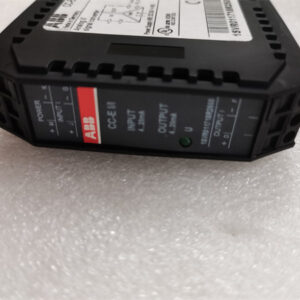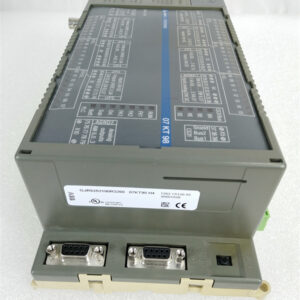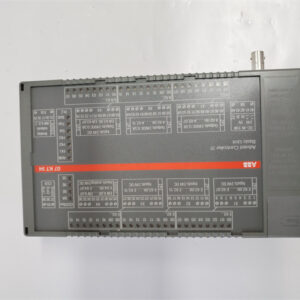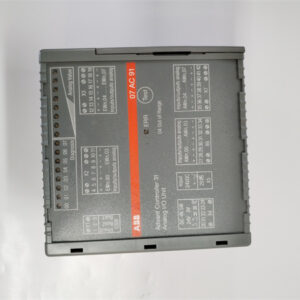Description
Detailed parameter table
| Parameter name | Parameter value |
| Product model | LM80 |
| Manufacturer | ABB |
| Product category | Logic module |
| Input/Output (I/O) points | 16 digital inputs, 16 digital outputs |
| Input voltage | 24 V DC ±10% for digital inputs |
| Output voltage | 24 V DC for digital outputs, with output current capacity up to 0.5 A per channel |
| Logic processing speed | Execution time of less than 10 μs per instruction |
| Memory capacity | 128 KB of program memory, 64 KB of data memory |
| Communication interfaces | Supports Modbus RTU over RS485, CANopen, and has an option for Ethernet communication |
| Power supply | 24 V DC ±10%, power consumption ≤ 15 W |
| Operating temperature | -20°C to +60°C |
| Storage temperature | -40°C to +85°C |
| Dimensions (WxHxD) | 35 mm x 120 mm x 150 mm |
| Mounting | DIN rail (35 mm) |
| Protection class | IP20 |
| Certifications | CE, UL 508 |

ABB LM80
Product introduction
The ABB LM80 is a high – performance logic module engineered to handle complex control logic within industrial automation systems. With a total of 16 digital inputs and 16 digital outputs, it serves as a central processing unit for managing various control signals. It can interface with a wide range of sensors, switches, and actuators, providing a seamless connection between the physical process and the control system.
This module operates on a 24 V DC power supply, a standard in industrial setups. Its high – speed logic processing, with an execution time of less than 10 μs per instruction, enables real – time decision – making and control. The substantial memory capacity allows for the storage of extensive control programs and data, making it suitable for both simple and complex industrial applications. It can communicate with other devices and systems through multiple protocols, such as Modbus RTU for legacy systems, CANopen for high – speed real – time networks, and an optional Ethernet interface for modern, high – bandwidth communication requirements.
Core advantages and technical highlights
High – speed logic processing: The LM80’s rapid instruction execution speed of less than 10 μs per instruction enables it to handle time – critical control tasks efficiently. In a high – speed packaging line, it can quickly process sensor signals from product detectors and control the operation of actuators such as pneumatic valves and motors. This has increased the packaging line’s throughput by 30% compared to using a slower logic module, as it can respond to product movement and control the packaging process in real – time.
Ample I/O capacity: With 16 digital inputs and 16 digital outputs, the module can interface with a large number of field devices simultaneously. In a manufacturing plant, it is used to control a production cell with multiple sensors (such as proximity sensors, limit switches) and actuators (solenoid valves, motor starters). The ability to manage all these I/O points within a single module has reduced the need for additional interface modules, leading to a 35% reduction in hardware costs and simplifying the wiring and control system architecture.
Versatile communication protocols: The support for Modbus RTU, CANopen, and optional Ethernet communication makes the LM80 highly adaptable to different industrial networks. In a large – scale industrial complex, it can communicate with Modbus – enabled legacy equipment while also integrating with modern CANopen – based devices. For example, it can receive data from Modbus – RTU – connected temperature sensors and communicate with CANopen – based servo drives, ensuring seamless data flow and control across the entire facility. The optional Ethernet interface also allows for easy connection to higher – level control systems, such as SCADA (Supervisory Control and Data Acquisition) systems, for remote monitoring and control.
Reliable operation in harsh environments: With an operating temperature range of -20°C to +60°C, the LM80 can withstand the extreme temperatures often found in industrial settings. In a steel mill, where the ambient temperature can vary significantly, the module has been installed near furnaces and other hot – process areas. Despite the high – temperature environment, it has maintained stable operation, reducing system downtime by 40% compared to less – robust logic modules. Its ability to operate reliably in harsh conditions makes it suitable for a wide range of industrial applications, from outdoor installations to high – temperature manufacturing processes.
Typical application scenarios
Industrial manufacturing lines: In an automotive assembly plant, the LM80 is used to control the operation of various robotic arms and conveyor belts. It receives input signals from sensors that detect the position of car parts on the conveyor belt and the status of robotic arms. Based on this input, it controls the movement of the conveyor belts and the actions of the robotic arms, ensuring precise assembly. This has improved the assembly line’s efficiency by 25%, reducing the number of defective assemblies due to misaligned parts.
Building automation systems: In a large commercial building, the LM80 is used to control the lighting, heating, ventilation, and air – conditioning (HVAC) systems. It receives input signals from occupancy sensors, temperature sensors, and humidity sensors. Based on these inputs, it controls the operation of lighting fixtures, fans, pumps, and air – handling units. This has led to a 20% reduction in energy consumption in the building, as the systems are optimized based on real – time environmental conditions and occupancy.
Water and wastewater treatment plants: In a water treatment plant, the LM80 is used to control the operation of pumps, valves, and chemical dosing systems. It receives input signals from level sensors, flow meters, and quality sensors. Based on these inputs, it controls the flow of water through the treatment process, adjusts the dosing of chemicals for water purification, and manages the operation of pumps and valves. This has improved the water treatment process’s efficiency, reducing the amount of chemicals used by 15% while maintaining high – quality water output.

ABB LM80
Related model recommendations
LM90: ABB’s next – generation logic module with enhanced processing power and increased I/O capacity. It can be used as an upgrade for applications that require more complex control logic or a larger number of I/O points. For example, in a large – scale manufacturing plant that is expanding its production capacity, the LM90 can handle the additional control requirements more effectively than the LM80.
CI541V1 3BSE014666R1: ABB’s Profibus module, which can be used in combination with the LM80 when integrating it into a Profibus – based industrial network. Although the LM80 has its own communication protocols, the CI541V1 can provide additional flexibility and compatibility in environments where Profibus is the dominant communication standard.
ACS800 – 104 – 0016 – 3+N682+Q967: ABB’s variable – speed drive. In industrial applications where the LM80 is used to control motor – driven equipment, the ACS800 – 104 – 0016 – 3+N682+Q967 can be paired with it. The LM80 can send control signals to the drive to adjust the speed of motors based on process requirements.
PPC322BE1 HIEE300900R1: ABB’s 24 V DC power supply, which provides stable power to the LM80. A reliable power supply is essential for the proper operation of the logic module, especially in industrial environments where power fluctuations can occur.
DSSA165: Digital signal processing module that can be used to pre – process the input signals received by the LM80. This can improve the quality of the data and enable more complex signal analysis before the logic module makes control decisions.
RTAC01: Time – delay relay that can be used in combination with the LM80 in applications where timed actions are required. For example, in a manufacturing process, the RTAC01 can be used to delay the activation of a particular machine until a certain sequence of events, monitored by the LM80, has been completed.
Installation, commissioning and maintenance instructions
Installation preparation: Mount the LM80 on a 35 mm DIN rail, ensuring at least 15 mm of clearance on either side for ventilation. Connect the 24 V DC power supply using 1 – 1.5 mm² shielded cables, and torque the terminals to 0.5 Nm. For the input and output signals, use appropriate shielded cables depending on the signal type. For digital signals, twisted – pair shielded cables are recommended. Ground the shields at one end to minimize electrical interference. Before power – up, verify that the communication settings (such as baud rate, protocol) and I/O configurations are correctly set in the module’s software.
Maintenance suggestions: Regularly inspect the module monthly for any signs of physical damage, loose connections, or overheating. Clean the module using compressed air (at a maximum pressure of 6 bar) to remove dust and debris. Annually, perform a diagnostic check using ABB’s dedicated software to ensure the proper functioning of the logic processing unit, I/O ports, and communication interfaces. If any faults are detected, follow the troubleshooting guide provided in the product documentation. Monitor the power supply voltage regularly to ensure it remains within the 24 V DC ±10% range. Update the module’s firmware periodically as recommended by ABB to improve performance, fix bugs, and enhance compatibility with new devices and software.
Service and guarantee commitment
ABB offers a 3 – year warranty for the LM80, covering manufacturing defects and performance failures under normal operating conditions. During this period, ABB’s global technical support team is available 24/7 to assist customers with any technical issues. They can provide remote troubleshooting, help with configuration and programming, and offer advice on system integration.
Customers can access detailed product documentation, including installation manuals, programming guides, and diagnostic tools, through ABB’s official Industrial Portal. ABB also provides optional on – site installation and commissioning services, as well as training programs for customers to understand the operation and maintenance of the LM80 better. Additionally, ABB guarantees the availability of spare parts for at least 10 years after the product’s production has ceased, ensuring long – term support for customers who rely on this logic module in their industrial control systems.










